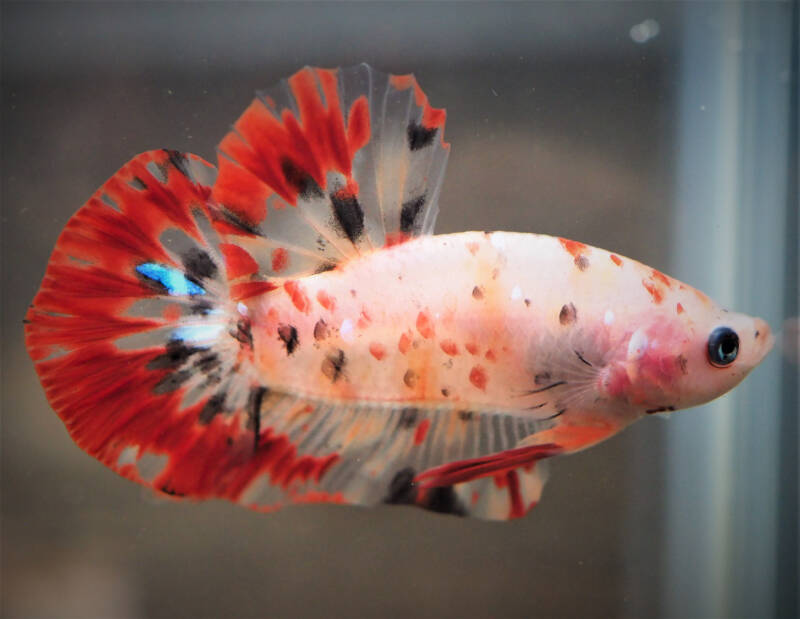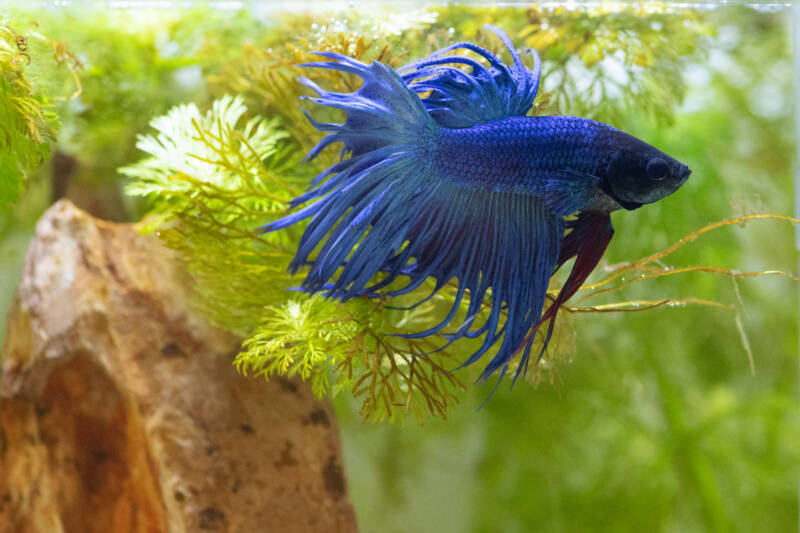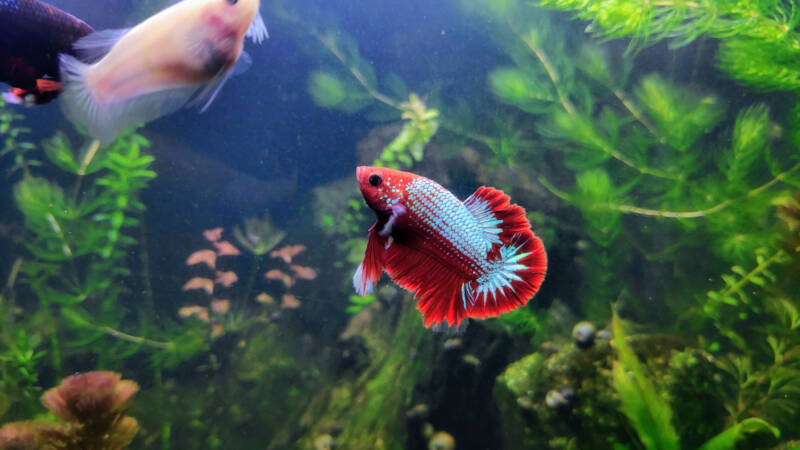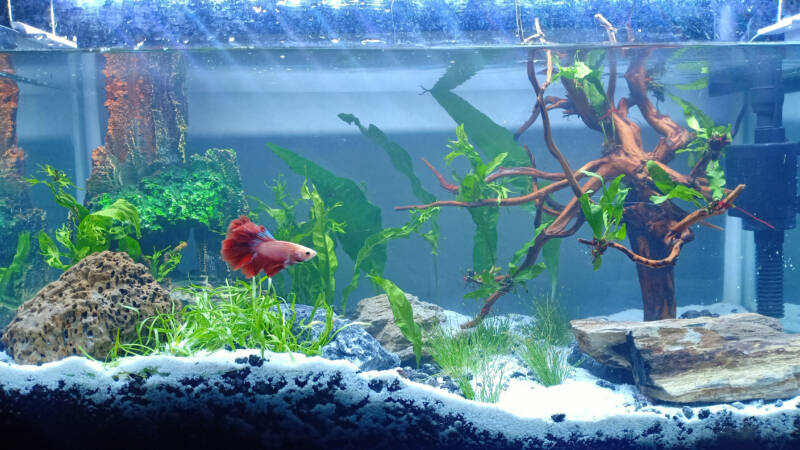Whether we are feeding our family or feeding our pets, nutrition is vital to overall health and wellbeing.
When it comes to our aquatic friends, we strive to give them foods and nutritional mixes that closely resemble what they would encounter in their native environments.

Betta fish are natural carnivores. In the wild, they love nothing more than to search for insects that have fallen into the water.
In addition, they will hunt for mosquito larvae and even small crustaceans.
In a home aquarium, betta fish thrive on a combination of betta pellets and supplemental meaty foods.
When supplementing, you may wonder if it is possible to feed your betta human foods as well.
Foods from your kitchen are acceptable if they are given from time to time and not as the bulk of your betta’s diet.
Take care and read on to learn which foods to give and which to avoid.
[toc]
Safe Human Foods for Your Betta

The following foods are safe to feed to your betta.
Always be sure to remove any uneaten foods as soon as possible. Food left to decay in the tank will negatively impact your water quality and your fish’s health.
Vegetables
Although bettas are primarily carnivores, vegetables can help aid in digestion by providing fiber.
Given occasionally, vegetables can prevent bloating and constipation in your fish.
Peas
You will find peas recommended often for many of our aquatic friends.
Not only are they a healthy source of vegetable matter, but they are rich in fiber that can help prevent digestive issues.
To feed peas to your betta, first, blanch or boil the peas until they are soft, remove the outer skin, and cut them into small pieces.
Leafy Greens
Good for you, good for your betta! Dark green, leafy varieties such as spinach and lettuce are excellent selections.
Be sure to slice the greens thin. Boiling them slightly can make them easier for your betta to consume.
Cucumber or Zucchini
To feed your fish cucumber or zucchini, first, peel and de-seed it, then blanch it and cut it into very small pieces.
Corn
Moderation is key when giving starchy vegetables, such as corn, as these contain few digestible nutrients.
A single, well-boiled kernel is all you need to feed your fish. Remove the outer skin to make the kernel more accessible to your betta.
Fruits
Fruit can be a nice treat for your fish. Many types of fruit are acceptable; however, avoid citrus fruits, which will negatively impact your water quality.
Apples and Pears
Remove the skin and slice the fruit thinly. Make sure there are no seeds in the portions you feed to your fish.
Melon
You may find that your betta loves an occasional piece of melon. Try ripe cantaloupe that is cut from the rind.
Carefully remove all seeds before feeding the melon to your fish.
Mango
This fruit is safe to give your betta provided you remove the skin and cut it into a single, tiny piece.
Remove it promptly after 30 minutes, whether or not your betta has eaten any of it. Mango left in the water longer than that can negatively impact your water and harm your fish.
Grains
Grains should be given sparingly as they would not be a regular part of a betta’s diet.
Rice
Cooked rice is okay to feed your betta, but it is definitely a “once in a while” treat.
The rice should be overcooked so that it is extra soft.
Avoid adding any oils or salt when cooking the rice. One or two grains is all your tiny betta fish will need.
Proteins
When seeking a source of proteins for your betta, go for those that come from aquatic sources rather than land-based meats.
Tuna
Raw tuna is a great protein for your betta fish. Make sure the tuna is packaged in water or brine and avoid those in oil.
Shrimp
Raw shrimp is another good option. Again, make sure the pieces are small, and the shrimp is unseasoned.
Do Not Feed These Foods to Your Betta

As is recommended for most pets (and humans, too!), avoid giving foods that are overly processed, sugary, or full of non-nutritious calories.
Processed Foods
These foods are not good for you, nor are they good for your betta. The additives and chemicals used to make processed foods can be toxic to your fish.
Processed Grains or Bread
These foods do not provide much in the way of nutrition and are made up of empty calories.
In addition, the yeast present in most breads can cause bloating in your fish.
Citrus Fruits
These fruits may be an excellent addition to your diet, but they do not go over so well with your betta.
The acidic nature of citrus fruits will impact your water’s pH, which in turn can affect your fish’s health.
Meat from Land-Based Sources
Chicken, beef, pork, and other land animal meat sources are all poor choices to feed your betta.
Your fish will not be able to process these proteins, which can cause digestive issues.
In addition, many meats contain antibiotics and steroids that would be foreign chemicals in your fish’s body.
Hard, Stringy, or Bitter Vegetables
Vegetables in this category include carrots, onions, and cabbage. These will be difficult for your betta to eat and digest.
How Much to Feed Your Betta

Bettas have a small stomach, roughly the size of their eye, and a short digestive tract.
These fish can easily overeat, which leads to health issues.
Any human foods given should be sized accordingly.
When cutting foods for your betta, think about making the pieces about the size of one-quarter of a pea. In most cases, a single piece is all you need.
How Often to Feed Your Betta

As part of their regular diet, many betta keepers recommend feeding your fish twice per day with a day or two per week of fasting to aid in digestion.
Others suggest an “every other day” feeding schedule.
Spread out their meals, giving them a total of two to three small meals per day.
For treats, such as human foods, a once per week feeding is sufficient.
How Long Without Food
Keep the schedule regular and do not go too long between feedings.
Wild bettas may be accustomed to going without food for up to 14 days, but in an aquarium, do not go longer than four or five days between meals.
Not eating for an extended period can cause an increase in your betta’s stress and aggression levels.
Feed Your Betta Well
The most nutritious food for betta fish will include a variety of protein sources.
For your betta fish’s regular diet, rely on high-quality betta pellets of the right size and nutritional balance.
Plus, they float at the surface, which encourages your betta’s natural feeding behavior.
Give your betta fresh food. Pellets that are older than six months should be discarded as they begin to lose their nutritional value after that time.
Supplement their nutrition with a treat or two a week to give your betta the variety it needs.
Consider the following live, frozen, or freeze-dried food:
- Brine shrimp
- Mosquito larvae
- Bloodworms
- Daphnia
- Copepods.
Any freeze-dried foods should be soaked in water prior to feeding.
Closing Thoughts
Remember that the best foods for betta fish are those that closely mimic foods found in their natural environment.
Betta specific pellets and meaty live, frozen, or freeze-dried foods are always best.
However, for those times when you are out of food, cannot make it to the store, or simply wish to treat your betta, you can give them vegetables, non-citrus fruits, rice, and select proteins from your kitchen.
Keep the portions small and only use human foods as an occasional treat.
Let’s hear from you! What human foods has your betta enjoyed?
